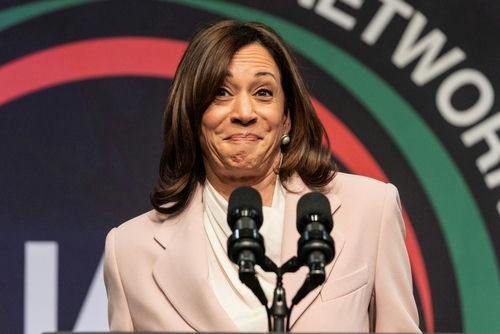Kamala Harris’s fundraising shortfall threatens to derail the Democratic National Committee’s financial stability.
Kamala Harris’s Fundraising Struggles
Kamala Harris, after her loss to President Trump in the 2024 election, has faced significant challenges in raising funds for the Democratic National Committee (DNC). Despite utilizing her campaign email list and hosting several fundraising events, the results have not met expectations. Reports from August 2025 highlight the DNC’s financial strain, with substantial payments made toward Harris’s campaign debts, causing concern among donors and party officials.
The financial burden left by Harris’s campaign is substantial. The DNC has paid between $15 and $20 million to cover these debts, which has severely impacted its cash reserves. As of August 2025, the DNC’s available funds have dwindled to $13.9 million, a stark contrast to the Republican National Committee’s robust $80 million. This financial imbalance could have significant repercussions as the party prepares for the 2026 midterm elections.
Internal Party Tensions and Donor Concerns
The DNC faces internal challenges as frustration mounts over its current financial predicament. Blame is largely directed at DNC Chair Ken Martin, criticized by allies of Kamala Harris for a perceived lack of focus on effective fundraising strategies. This internal discord has exacerbated donor hesitancy, with many questioning the party’s financial management and strategic direction going forward. Some donors are wary of contributing further, fearing inefficient use of their contributions.
Efforts to reinvigorate party finances have been emphasized by Harris’s team, with spokesperson Jen O’Malley Dillon stating that Harris is committed to expanding the grassroots donor base. However, restoring confidence among donors and addressing internal divisions remain critical hurdles that the DNC must overcome to ensure its competitive edge in upcoming elections.
Long-term Implications for the Democratic Party
In the short term, the DNC’s limited cash reserves limit its ability to support candidates and initiatives for the 2026 midterms. Long-term, donor skepticism and internal divisions could undermine the party’s competitiveness and fundraising infrastructure. The financial weaknesses currently faced by the DNC may also impact its campaign operations and voter outreach efforts. As the Republican Party enjoys a fundraising advantage, these challenges could potentially translate into electoral gains for conservatives in the near future.
The broader Democratic coalition faces a period of strategic and financial uncertainty. This situation shines a spotlight on the risks associated with high-cost, short-duration campaigns. As the party navigates this challenging landscape, there may be calls for reforms in campaign finance management and donor engagement strategies to prevent similar financial crises in the future.

